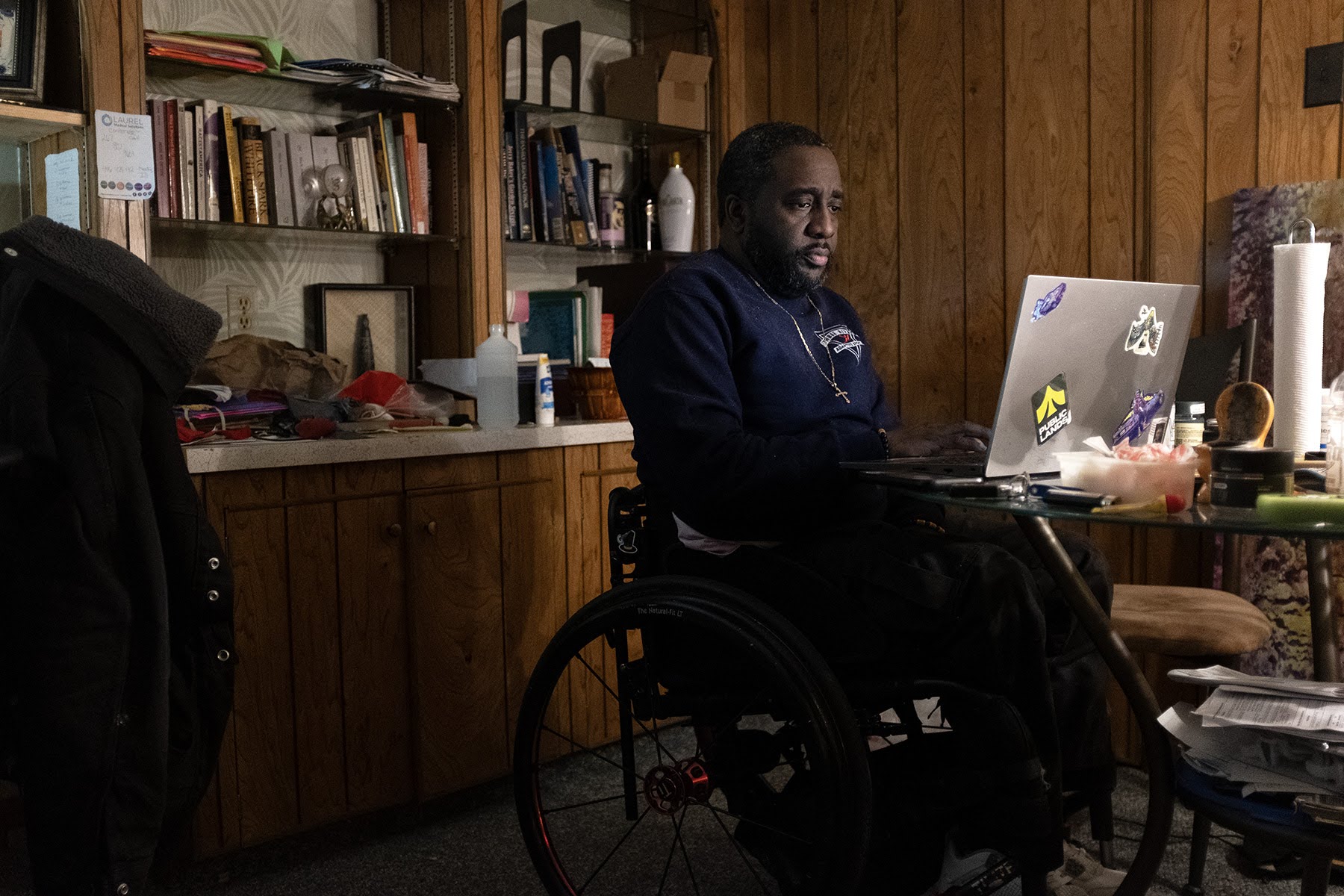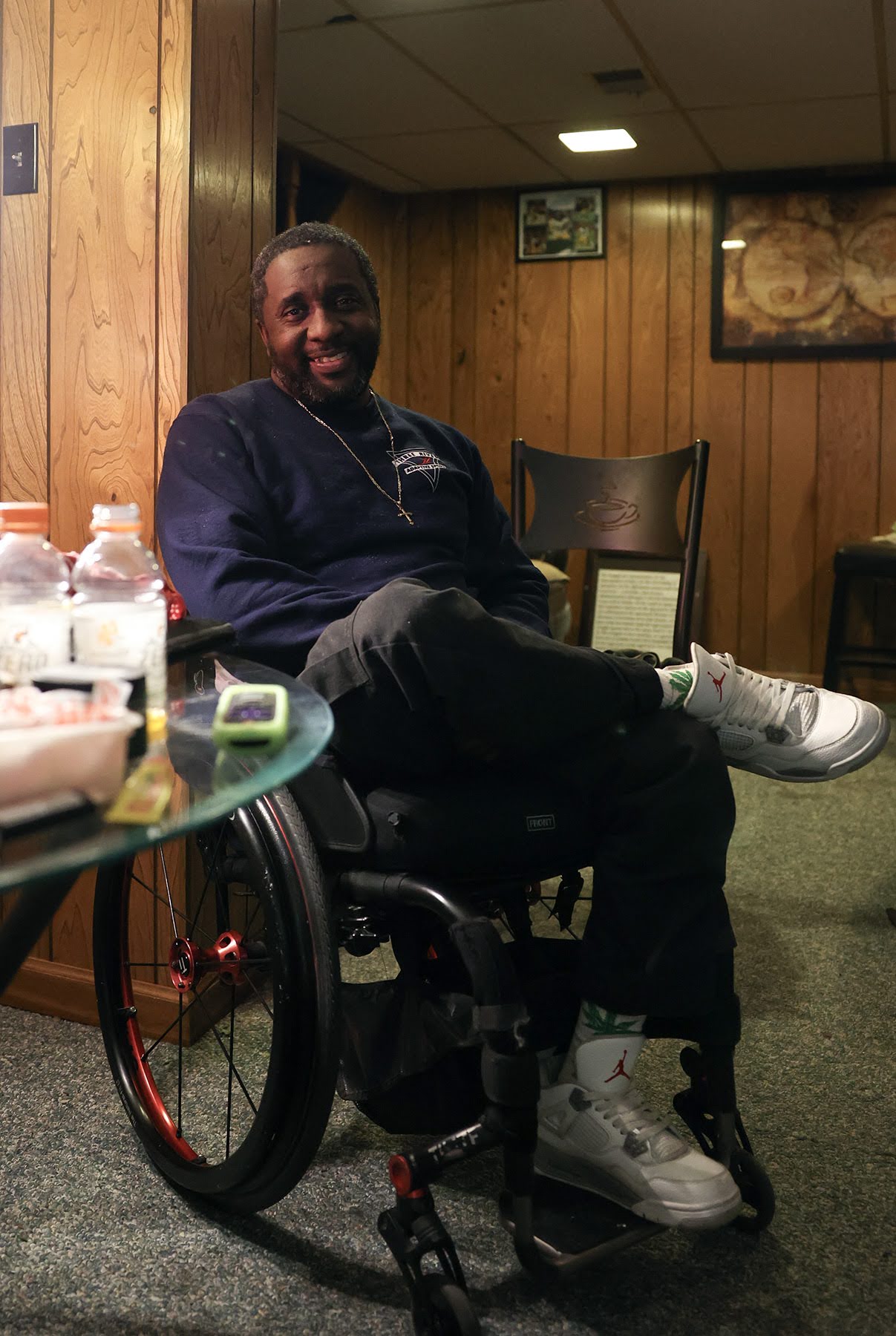Lester Bennett poses for a portrait, Thursday, Dec. 5, 2024, at his home in Homewood. (Photo by Anastasia Busby/PublicSource)
People with disabilities frequently can’t get the health care they need, and racial and ethnic minorities have lower trust in the medical system.
“PublicSource is an independent nonprofit newsroom serving the Pittsburgh region. Sign up for our free newsletters.”
Lester Bennett was 19 when a gunshot wound injured his spinal cord after someone attempted to rob him at the South Hills Junction station in 1994. The Americans with Disabilities Act [ADA] had just been passed four years prior. Now, 30 years later, Bennett still encounters bias in health care because of his physical appearance, despite protection under the ADA.
Bennett, a Black man who uses a manual wheelchair, is using his degree in rehabilitation science and experiences as a person with a disability to make sure “no one else goes down the same path.” Bennett works for Laurel Medical Solutions as a patient care coordinator, helping to provide manual and power wheelchairs for people with disabilities.
“When I think about my health care system, we have to keep in mind that we are individual people,” Bennett said. “People have to acknowledge their biases.”

A new report released by the FISA Foundation* highlights the systemic barriers people with disabilities face when seeking equitable health care.
Drawing from published research and local voices, the report calls attention to three key barriers to health care for people with disabilities: inaccessibility, pervasive bias and ableism, and financial strain.
Accessibility barriers prevented several patients from receiving routine care, from getting weighed to getting a mammogram, the report noted. Additionally, bias and discrimination have led to a lack of care and feelings of neglect, making self-advocacy burdensome.
“These barriers aren’t new,” said Jessica Jarvis, an assistant professor in the department of physical medicine and rehabilitation at the University of Pittsburgh and the report’s lead author.
“People with disabilities are more than just their disability, they have other aspects of their identity that go beyond their disability. They can be a Black woman or a transgender man or something else, and so often those barriers start layering with the other barriers and inequities that they might experience with having a disability.”
This compounding of barriers can create additional difficulties, cumulatively impacting patient well-being and access to care.
Belonging to multiple marginalized groups can create barriers that are “bidirectional,” which mutually influence each other, said Dr. Bethany Ziss, a provider and specialist in developmental-behavioral pediatrics. Ziss said this relationship can be observed among people with disabilities who also experience poverty or belong to a racial or ethnic minority group.
“One thing I see a lot in my practice is the intersection between specifically neurodiversity and LGBTQIA+ queer identities,” said Ziss. “The level of fear that many, especially gender-nonconforming people, have about how they will be treated … is very, very real, and it’s a huge barrier to care.”

Trust between patient and provider is crucial
Difficulty accessing equitable health care can lead to distrust in health care providers, notes the report.
Bennett, who has personally experienced bias from providers because of his disability, pointed out the need to build trust goes both ways.
“In the Black community, a lot of us are [against] going to the doctor,” Bennett said. “We know from our personal experience how this country has treated us and our bodies.”
This distrust can cause additional strain and anxiety for a person with a disability and ultimately threaten physical health outcomes.
For Bennett, the stigmatizing assumption that people with disabilities cannot be in relationships significantly impacted the course of his rehabilitation. Bennett recalls being taught about other life skills — like how to cook — but he lacked guidance and counseling from health care providers about how to participate in relationships.
“That discussion was delayed, so it delayed my growth,” Bennett said. “I had to learn it myself … learn from the streets.”
Despite the struggles Bennett has faced, he acknowledges that his successes have in part resulted from trusting his doctor.
“I have made it this far because I have listened to my doctor,” Bennett said. “As an advocate, I want people to recognize that you don’t know everything … [and] as a clinician, you have to listen to your patient.”
Ziss echoed this sense of mutual responsibility from her perspective as a provider.
“I think one thing the cause really needs is people like me who play for both teams to see both sides,” said Ziss, who has a disability.
‘I cannot afford to be successful’ on Medicaid
For many people with disabilities, Medicaid is crucial for financial support and coverage of costly medical equipment and medications. However, with its strict income limit for long-term care, necessary medical coverage can become increasingly difficult for people like Josie Badger, who has a neuromuscular disorder called congenital myasthenic syndrome.
“I cannot afford to be successful because I would lose my Medicaid benefits,” said Badger, 40, a business owner who lives in New Castle.

People with disabilities are 70% more likely to report that they could not receive the health care they needed because of the cost compared to those without disabilities.
In addition to cost barriers, Badger, who described her childhood as “very privileged,” said she still faced discrimination when attending medical appointments.
“My parents were always told at the hospital to make sure I was well dressed,” said Badger. As noted in the FISA report, a person with a disability who is better dressed was more likely to receive better quality care if they were perceived as “more likeable” or “worthy of care.”
Badger said she has not been weighed at a doctor’s office in “quite a while.” She often gets her weight taken at PetSmart or a veterinarian office because their scales are wheelchair accessible.
To address the discrimination and ableism that exists in medicine, there needs to be a “reframing of how we think about disability,” specifically from an educational standpoint, said Dr. Amy Houtrow, chief of pediatric rehabilitation medicine services at UPMC Children’s Hospital of Pittsburgh and one of the report’s authors.
“Understanding that disability isn’t a negative consequence of disease but it’s a part of people’s identities and who they are, learning how they live their lives is an important aspect to round out people’s understanding of disability,” Houtrow continued. “As a disabled person myself, I can’t imagine that I would be who I am without being disabled.”
*PublicSource receives funding from the FISA Foundation.
Amber Frantz is an editorial intern at PublicSource. She can be reached at [email protected].
This story was fact-checked by Jamie Wiggan.
This article first appeared on PublicSource and is republished here under a Creative Commons license.